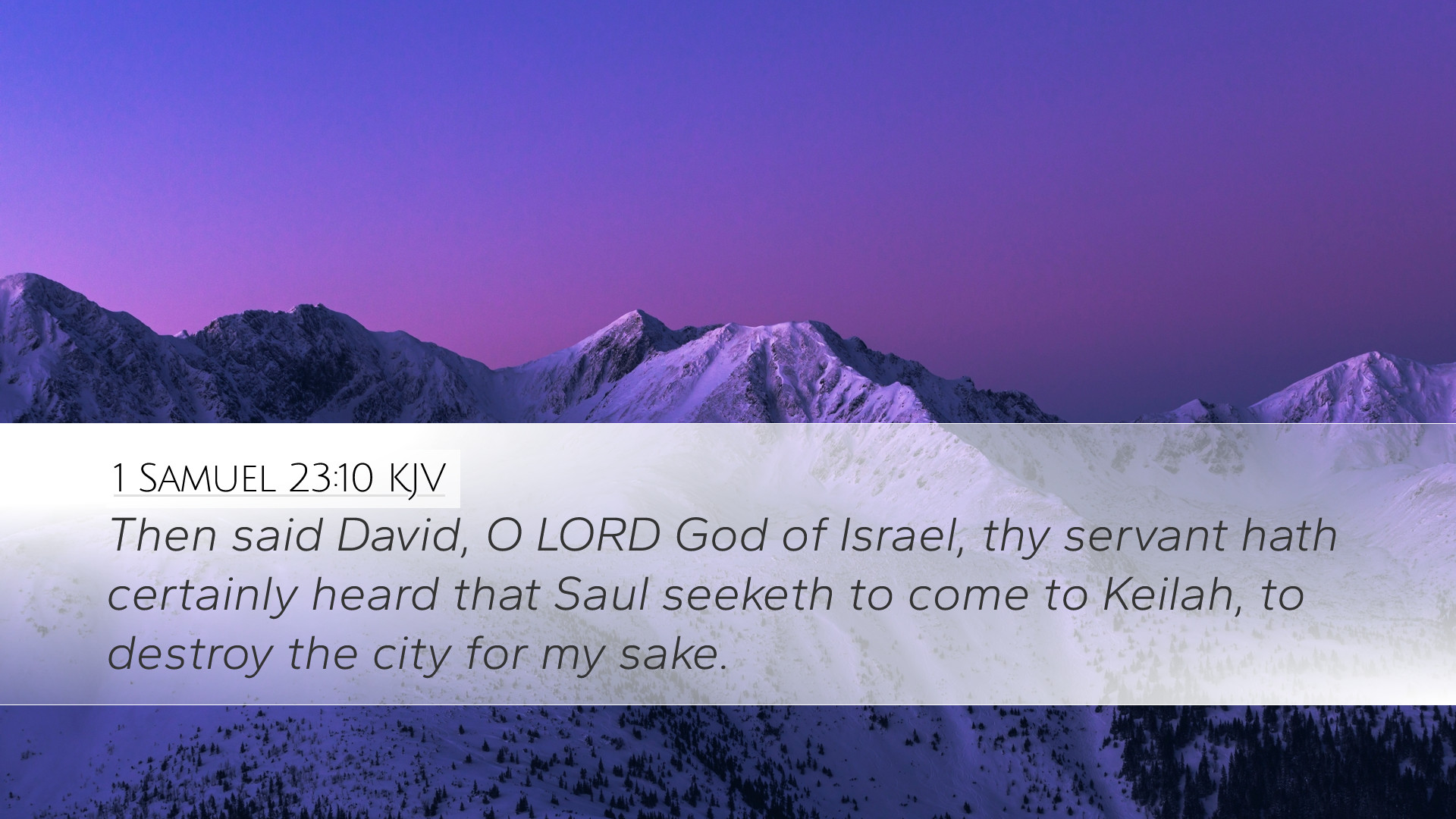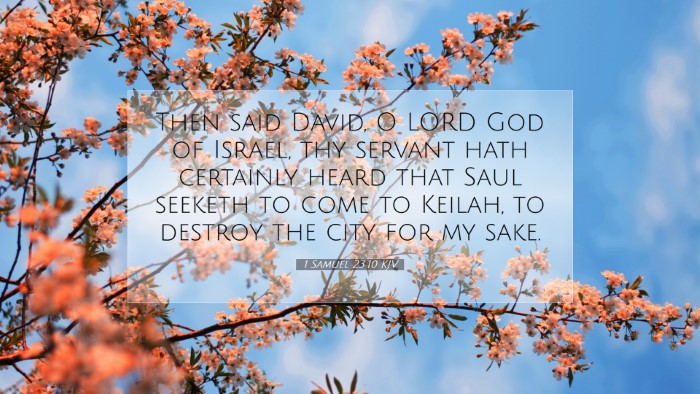Commentary on 1 Samuel 23:10
Verse Reference: 1 Samuel 23:10 - "Then said David, O LORD God of Israel, thy servant hath certainly heard that Saul seeketh to come to Keilah, to destroy the city for my sake."
Introduction
The narrative of 1 Samuel 23:10 presents a critical moment in David's life, where he seeks divine guidance amidst peril. This verse is laden with themes of divine sovereignty, personal integrity, and the weight of leadership. It is essential for pastors, students, and theologians to explore the deeper meanings behind David's plea to God and the contextual backdrop of his circumstances.
Contextual Analysis
In 1 Samuel 23, David is on the run from Saul, who is increasingly consumed by jealousy and rage towards him. Keilah, a city in Judah, is under threat of assault from Saul's forces because of David's presence. David's inquiry to God reflects not only his reliance on divine insight but also his concern for the innocent lives that could be caught in the crossfire of this conflict.
Historical Background
- The events occur during the period of Saul's kingship when David, anointed by Samuel, finds himself at odds with the reigning king.
- David's experience illustrates the challenges of leadership and the moral complexities of warfare.
- Keilah represents a microcosm of the struggle between loyalty to God and the harsh realities of political power plays.
Theological Insights
This verse and its context provide significant theological insights:
- The Nature of Divine Guidance: David's prayer is a profound example of seeking God's will. His approach emphasizes the importance of prayer in decision-making, especially in times of crisis.
- The Concept of the Sovereignty of God: David acknowledges God's ultimate authority over events, showing his understanding that human actions alone do not dictate outcomes.
- Concern for Others: David's plea encapsulates a leader's responsibility to care for the welfare of others—here, the people of Keilah, at risk because of his actions.
Commentary from Matthew Henry
Matthew Henry emphasizes the earnestness of David's prayer and the humility with which he approaches God. He notes how David explicitly addresses God as "LORD God of Israel," indicating recognition of God's covenantal relationship with His people. Henry highlights that David’s concern is not solely for his safety but for the potential devastation that Saul's wrath could bring upon innocents in Keilah.
Commentary from Albert Barnes
Albert Barnes provides further insights into the complexities of David's situation. He points out that David is not only concerned about himself but is mindful of the repercussions his presence could have on the city. Barnes argues that this prayer reflects a deep spirituality and reliance on God, illustrating how David sought guidance regarding whether to stay or flee, knowing the impending danger.
Commentary from Adam Clarke
Adam Clarke elaborates on the historical context of Keilah and its significance as a place of refuge for David. Clarke notes that David's intercession is crucial because it demonstrates his character as a leader who prioritizes the safety of others over his own comfort. He suggests that David's commitment to seeking God in a time of distress offers a model for leaders today—highlighting the necessity of divine consultation in moments of uncertainty.
Practical Applications
The insights from this verse can be practically applied in various ministerial and personal contexts:
- Seeking God's Will: Just as David sought divine guidance, pastors and leaders are called to prioritize prayer in decision-making processes.
- Understanding Leadership Responsibility: The implications of leadership extend beyond personal interests; it involves the welfare of those one is responsible for.
- Emphasizing Community Care: A focus on the safety and well-being of community members should shape how leaders conduct their ministry.
Conclusion
1 Samuel 23:10 serves as a poignant reminder of the importance of divine guidance in leadership and decision-making. Through David’s example, we are urged to bring our concerns before God, acknowledging His sovereignty and our accountability to those around us. The collective insights from Matthew Henry, Albert Barnes, and Adam Clarke enrich our understanding of this verse, offering both theological depth and practical wisdom that can be applied in diverse contexts.


